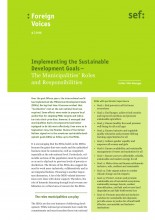One of the concrete commitments from the Addis Ababa Action Agreement and the 2030 Agenda for Sustainable Development (2030 ASD) is the Technology Facilitation Mechanism (TFM). Spearheaded by Brazil and France, the development of the TFM has been described by Sérgio Rodrigues dos Santos of Brazil, as a “testimony to the strength of multilateralism through collective action.”
Expectations are high for TFM in a briefing on its progress, the President of the UN General Assembly lauded the TFM launched in [...]

